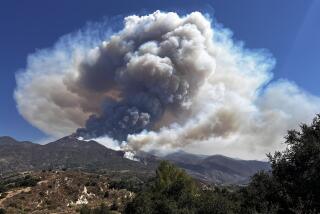On-Off Wildfire Funding
Every spring, Forest Service officials yell “Fire!” in crowded legislative hearing rooms in an attempt to get more funding. This time, their talk of an ominous, early fire season in Southern California and across the West is all too true. Exhibit No. 1: the wildfires that swept areas from Santa Clarita to Camp Pendleton over the last few days.
Cold temperatures in the tropical Pacific over the winter produced weather patterns that caused dry conditions in the West, and forecasts call for warmer-than-usual temperatures this summer. Droughts have hindered the controlled burns used to get rid of small trees and brush while sparing large trees. A century of fire control, aimed at quickly suppressing fires at all costs, has allowed this underbrush to accumulate, becoming kindling that turns small brush fires into devastating conflagrations.
Most problems, including this one, come down to more than just throwing money at them. But the $39 million that the Bush administration seeks to cut from the federal government’s fire prevention budget should be restored this year.
The funding is part of a supplemental budget, called the National Fire Plan, that Congress gave the Forest Service and Interior Department in 2000 after a savage fire season. It is aimed at helping those agencies pay for controlled burns and other fire reduction programs.
Admittedly, restoring $39 million to the approximately $2 billion that Congress has allocated for the National Fire Plan is only part of a solution. Congress also needs to examine its own behavior. It tends to shower the Forest Service with funding after devastating summer fires and stiff the agency in other times. Lawmakers philosophize that fires should be allowed to burn because they are part of a balanced ecosystem, but they rail against the practice when a fire threatens the Wyoming ranches or California beach houses of wealthy constituents.
The argument between let-it-burn and fight-every-fire has raged for nearly a century. In 1908, William Mulholland, architect of the Los Angeles water system, refused to send men to battle fires burning in Southern California mountains. Big fires, Mulholland insisted, were beyond “the power of man to stop.” Mulholland’s notion that fires are ecologically healthy has become conventional wisdom, but it was considered blasphemous through most of the 20th century.
Decades of fire mismanagement can’t be corrected in a day, but the fire planning fund, if it is kept healthy, can establish a lasting middle ground for forest fire management.
More to Read
Sign up for Essential California
The most important California stories and recommendations in your inbox every morning.
You may occasionally receive promotional content from the Los Angeles Times.









